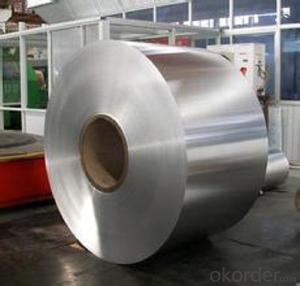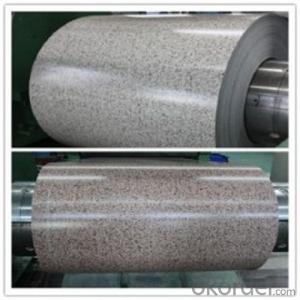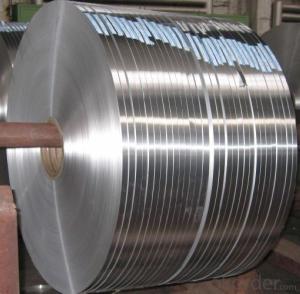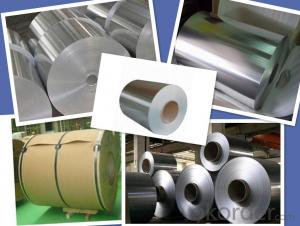Aluminum Coil 3003 H14 for Air Conditioning Condensers
- Loading Port:
- Shanghai
- Payment Terms:
- TT OR LC
- Min Order Qty:
- 2.5
- Supply Capability:
- 5000 m.t./month
OKorder Service Pledge
OKorder Financial Service
You Might Also Like
Item specifice
Aluminum Coil 3003 H14 for Air Conditioning Condensers
l Product Introduction
Aluminium Coil is widely used in manufacturing aluminum thin sheet and aluminum foil. It is suitable for further machining with original standard quality. It is easy to be controlled and be manufactured to according to requirements.
l Product Specification
Grade: 3000 series
Alloy or not : Alloy
Thickness :0.15-3.0mm
Width:7.5-2000mm
Place of origin: Jiangsu province ,China mainland
Certificate: ISO9001:2008 ISO14001:2004 ,MSDS ,SGS ,Mill test ,GB/T3880-2006
Typical Chemistry:
Cu: 0.20
Si: 0.60
Fe: 0.70
Mn: 1.0/1.5
Zn: 0.10
Aluminum: Balance
Characteristics: The 3003 alloy is non-heat-treatable, its corrosion resistance and formability are excellent, but its anodizing characteristics are rated as fair.
Mechanical Properties:
Tensile Strength: 110-205
Yield Srength: 40-190
Elongation: 30-4
Brinell Hardness: 28-47
Typical Application:
3003 is often used in general sheet metal work, stamped, spun and drawn parts, cabinets, mail boxes, food and chemical storage and handling. If part is to be anodized consider 5005, if higher strength is desired consider 5052.
l Packaging & Delivery
Packaging detail: Standard seaworthy exporting carton, Wooden pallets, waterproof paper and plastic coverage or as customer's requirements
Delivery detail: about 25 days from received oiginal L/C or advanced payment
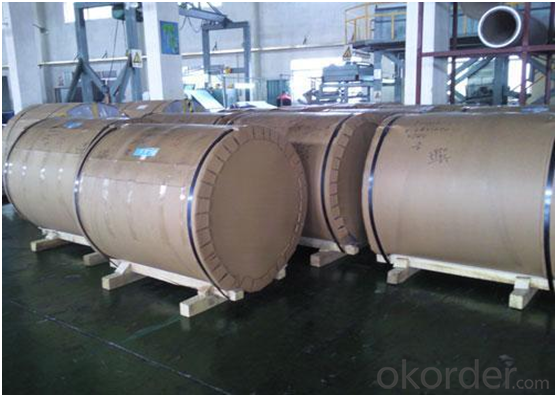
l Company Profile
CNBM International Corporation, China National Building Materials (Group) Corporation, is one of the largest companies in China building material & equipment industry, with 42,800 employees and sales in 2005 of US Dollar 4.395 billion. In 2006, China National Building Material Company Limited was listed on Hong Kong Stock Market with the stock code as 3323.
Aluminium coil is one of the popular product in the market of CNBM. With advanced technology and equipment, CNBM has sold its hight quality color coated aluminium coil to the world.
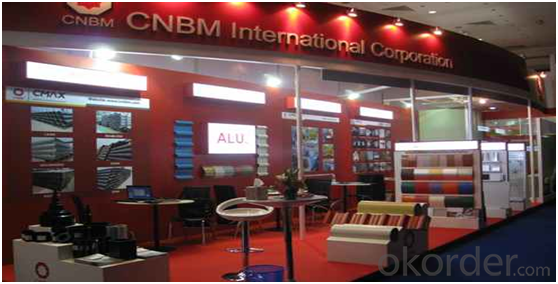
l CNBM World Wide
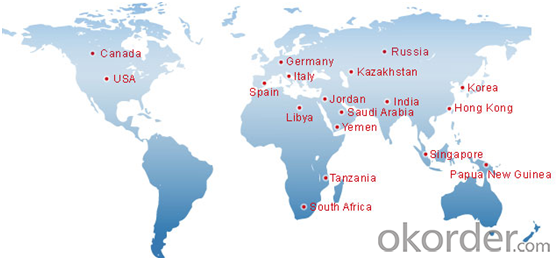
l Product Images
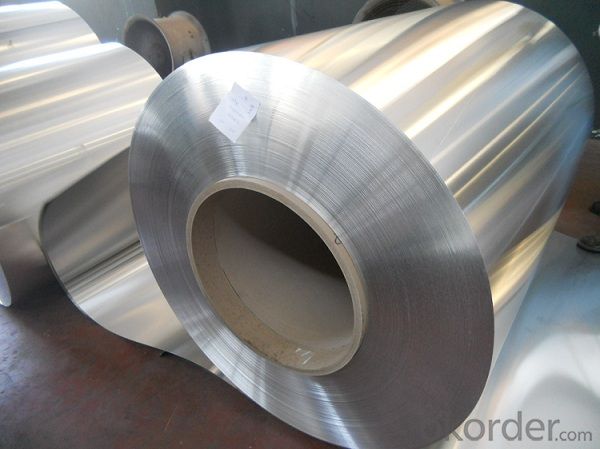
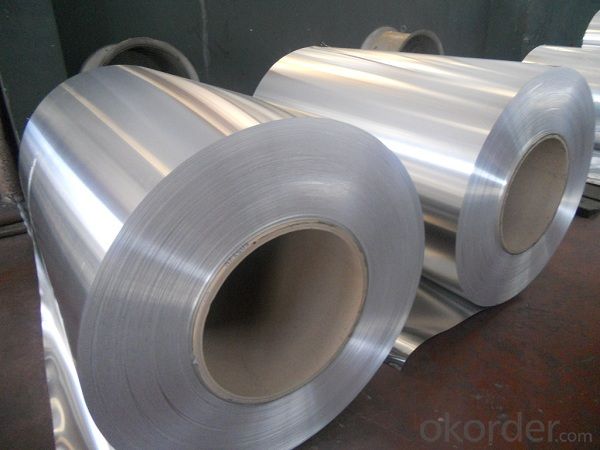
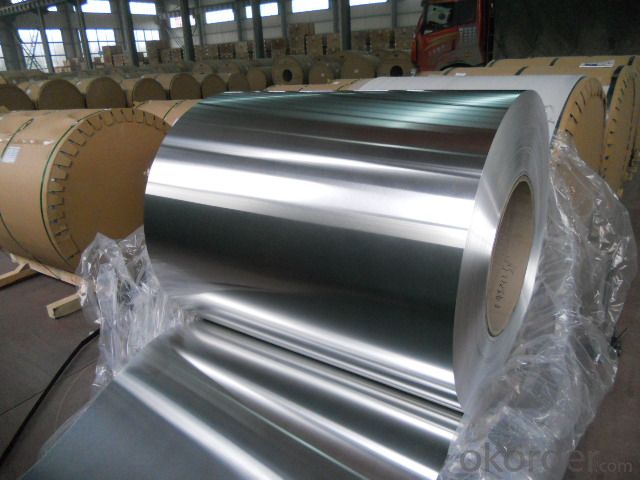
l Certificates
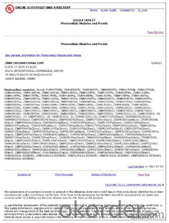
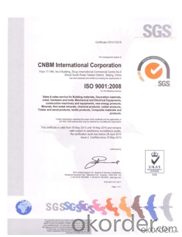
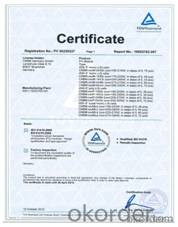
l FAQ
Q: Do you provide free samples?
A: Yes, free samples will be sent to you on freight at destination.
Q: Can I get your latest products catalogue?
A: Yes, it will be sent to you in no time.
Q: What is the MOQ?
A: 2.5 tons
Q: What are your payment terms?
A: We accept L/C, T/T.
- Q:Are there any specific guidelines for the handling of aluminum coils?
- Yes, there are specific guidelines for the handling of aluminum coils. Here are some key points to consider: 1. Proper lifting techniques: When handling aluminum coils, it is important to use appropriate lifting equipment such as cranes or forklifts. These tools should have the capacity to handle the weight of the coils to prevent accidents or damage. 2. Protective gear: Workers should wear personal protective equipment (PPE) such as gloves and safety goggles to protect themselves from sharp edges or potential injuries during handling. 3. Secure packaging: Aluminum coils should be stored or transported in secure packaging to prevent damage. This can include using suitable pallets, straps, or protective covers to ensure the coils are held in place and protected from external factors like moisture or impact. 4. Proper stacking: When storing or transporting aluminum coils, it is important to stack them in a way that ensures stability and prevents them from falling or causing accidents. Coils should be stacked evenly and securely, with adequate support and space between each stack to avoid deformation or damage. 5. Avoid contact with corrosive materials: Aluminum coils should not come into contact with corrosive materials such as acids or alkalis, as they can cause damage or corrosion to the metal. It is important to store aluminum coils in a clean and dry environment to preserve their quality. 6. Handling with care: Aluminum coils are susceptible to scratches, dents, and other damage, so they should be handled with care to avoid these issues. Avoid dragging or sliding the coils during handling and ensure that they are placed gently to prevent any potential damage. 7. Training and supervision: Workers involved in the handling of aluminum coils should be adequately trained and supervised to ensure they are following the specific guidelines and safety procedures. Regular training sessions can help refresh their knowledge and reinforce safe handling practices. Following these guidelines will help ensure the proper handling of aluminum coils, reducing the risk of accidents, damage, or loss of quality.
- Q:How do aluminum coils compare to other non-ferrous metals like titanium?
- Aluminum coils are generally lighter, more affordable, and easier to work with compared to non-ferrous metals like titanium. However, titanium possesses superior strength, corrosion resistance, and heat resistance properties, making it a preferred choice for applications requiring high performance and durability.
- Q:How are aluminum coils protected against dust and dirt during storage?
- Aluminum coils are protected against dust and dirt during storage through various measures to ensure their quality and prevent any potential damage. One common method is to wrap the coils securely with a protective covering, such as plastic or polyethylene sheets, to create a barrier against dust and dirt particles. This covering is usually tightly sealed to prevent any contaminants from entering. In addition to the wrapping, other precautions are taken to minimize the risk of dust and dirt accumulation. Storage areas are often kept clean and free from debris to reduce the likelihood of contaminants settling on the coils. Regular cleaning and maintenance of the storage space are necessary to maintain a dust-free environment. Moreover, proper ventilation and air filtration systems are employed in storage facilities to control airborne particles and maintain a clean atmosphere. These systems help to reduce the amount of dust and dirt that can settle on the coils. It is also crucial to handle the aluminum coils with care during transportation and storage to avoid unnecessary exposure to dust and dirt. Employing proper handling equipment and techniques, such as using clean gloves and avoiding dragging the coils on the ground, can prevent the accumulation of contaminants. By implementing these protective measures, aluminum coils can be stored safely and securely, ensuring their quality remains intact and preventing any potential issues caused by dust and dirt accumulation.
- Q:How are aluminum coils processed to achieve desired mechanical properties?
- Aluminum coils are processed using various techniques to achieve the desired mechanical properties. One commonly used method is called annealing. Annealing is a heat treatment process in which the coils are heated to a specific temperature and then cooled slowly. This process helps to reduce internal stresses and improve the metal's ductility and toughness. Another important process is cold rolling. Cold rolling involves passing the coils through a series of rollers at room temperature to reduce their thickness and improve their mechanical properties. This process not only increases the strength of the aluminum but also enhances its surface finish. To further enhance the mechanical properties, aluminum coils can also undergo alloying. Alloying involves mixing the aluminum with other elements like copper, manganese, or magnesium to form specific alloys. These alloys offer improved strength, corrosion resistance, and other desirable properties. Additionally, aluminum coils can be subjected to heat treatments like precipitation hardening. This process involves heating the coils to a specific temperature and holding them there for a certain period, followed by rapid cooling. Precipitation hardening allows the metal's microstructure to form fine particles, which increase its strength and hardness. Lastly, surface treatments such as anodizing or painting can also be applied to aluminum coils to enhance their mechanical properties. Anodizing forms a protective oxide layer on the surface, improving corrosion resistance, while painting provides additional protection and aesthetic appeal. In summary, aluminum coils are processed through techniques such as annealing, cold rolling, alloying, heat treatments, and surface treatments to achieve the desired mechanical properties. These processes can enhance the strength, ductility, toughness, and corrosion resistance of the aluminum, making it suitable for a wide range of applications.
- Q:What is the maximum coil width available?
- The maximum coil width available varies depending on the specific application and industry. However, it can range from a few inches to several feet, depending on the capabilities of the coil processing equipment and the requirements of the customer.
- Q:I want to paint my cars rims and grill metallic pink. But supposedly paint doesn't stick well to aluminum. What can I do to make it stick better and not chip?
- make sure the aluminum is ruffed up with at least 800 grit sand paper after that clean well and make sure is is dry after you clean after that use a product called adhesion promoter it will help the paint stick to the wheel hope this helps
- Q:How do you clean and maintain aluminum coils?
- To clean and maintain aluminum coils, you can follow a few simple steps. First, gather the necessary materials, including a soft brush or vacuum cleaner, a mild detergent or coil cleaner, a water hose, and a spray bottle. Start by turning off the power supply to the unit and ensuring that it is safe to proceed. Next, remove any debris or loose dirt from the coils using a soft brush or a vacuum cleaner with a brush attachment. Be gentle to avoid damaging the fragile fins of the coils. Once the loose dirt is removed, mix a solution of mild detergent or coil cleaner with water in a spray bottle. Spray the solution onto the coils, ensuring that it covers the entire surface. Let it sit for a few minutes to allow the solution to penetrate the dirt and grime. After the solution has had time to work, use a soft brush or a soft cloth to gently scrub the coils. Be careful not to apply excessive pressure or use abrasive materials, as this could cause damage. Pay extra attention to any areas with stubborn dirt or buildup. Once you have thoroughly cleaned the coils, rinse them off with a water hose. Ensure that all the detergent or coil cleaner is completely washed away. Make sure to direct the water flow in the opposite direction of the air flow to avoid pushing debris further into the coils. After rinsing, allow the coils to dry completely before turning the power supply back on. This will prevent any potential electrical hazards. You can use a fan or leave the coils to air dry naturally. To maintain the cleanliness of the coils, it is recommended to clean them at least once a year or more frequently if the unit is exposed to heavy dirt or debris. Regularly inspecting the coils for dirt buildup and promptly cleaning them will help maintain the efficiency and extend the lifespan of the aluminum coils.
- Q:What is the average lifespan of aluminum coils?
- The average lifespan of aluminum coils can vary depending on various factors such as usage, maintenance, and environmental conditions. However, with proper care and maintenance, aluminum coils can typically last for 15 to 20 years or more.
- Q:What are the potential risks of using aluminum coils in specific applications?
- The potential risks of using aluminum coils in specific applications include corrosion, especially in environments with high humidity or acidic conditions. Aluminum coils are also more susceptible to damage and denting compared to other materials. Additionally, aluminum coils may have lower heat transfer capabilities, which could affect the efficiency of certain applications.
- Q:What are the safety considerations when working with aluminum coils?
- To ensure the well-being of workers and prevent accidents, there are several safety considerations that must be taken into account when working with aluminum coils. First and foremost, workers must wear the necessary personal protective equipment (PPE) such as gloves, safety glasses, and protective clothing. This is crucial in safeguarding against cuts, abrasions, and burns that may occur during the handling of sharp edges or the coil manufacturing process. Proper storage of aluminum coils is also essential in preventing potential hazards. It is important to stack the coils in a stable manner, taking into consideration the weight and height of the stack. Additionally, they should be stored in a well-ventilated area to avoid the accumulation of flammable gases or vapors. Awareness of the potential risks associated with aluminum is paramount when working with the material. Aluminum is combustible, and factors like high temperatures and contact with sparks or open flames can heighten the risk of fire. Therefore, it is crucial to maintain a clean work area, free from any flammable materials or sources of ignition. Furthermore, handling aluminum coils with care is necessary to avoid injuries. Due to their weight, proper lifting equipment or techniques should be employed to prevent strains or musculoskeletal injuries. Workers must be trained in proper lifting techniques and be mindful of their physical limitations to prevent accidents. When it comes to cutting or shaping aluminum coils, it is imperative to use appropriate tools and machinery. Workers must receive training on the safe operation of these tools and machinery to avoid injuries. Regular inspection and maintenance of the equipment are also important to ensure their safe functioning. Lastly, following proper handling and disposal procedures for aluminum coils is essential. This may involve considering recycling options to minimize waste and environmental impact. In conclusion, safety considerations when working with aluminum coils encompass wearing appropriate PPE, proper storage, awareness of fire hazards, careful handling, the use of suitable tools and machinery, and adherence to proper handling and disposal procedures. By adhering to these safety measures, the risk of accidents and injuries can be significantly reduced.
1. Manufacturer Overview |
|
|---|---|
| Location | |
| Year Established | |
| Annual Output Value | |
| Main Markets | |
| Company Certifications | |
2. Manufacturer Certificates |
|
|---|---|
| a) Certification Name | |
| Range | |
| Reference | |
| Validity Period | |
3. Manufacturer Capability |
|
|---|---|
| a)Trade Capacity | |
| Nearest Port | |
| Export Percentage | |
| No.of Employees in Trade Department | |
| Language Spoken: | |
| b)Factory Information | |
| Factory Size: | |
| No. of Production Lines | |
| Contract Manufacturing | |
| Product Price Range | |
Send your message to us
Aluminum Coil 3003 H14 for Air Conditioning Condensers
- Loading Port:
- Shanghai
- Payment Terms:
- TT OR LC
- Min Order Qty:
- 2.5
- Supply Capability:
- 5000 m.t./month
OKorder Service Pledge
OKorder Financial Service
Similar products
New products
Hot products
Hot Searches
Related keywords
